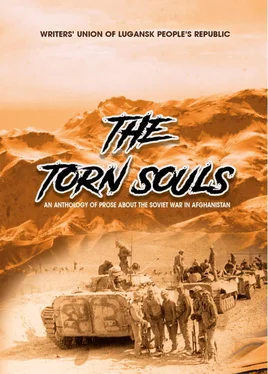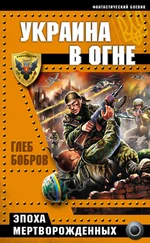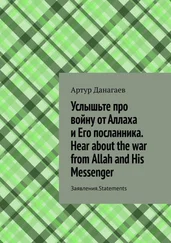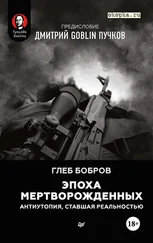Mujahidin had killed his father. Military men told this when they had brought a big “iron” box in which, according to them, his father was. It was difficult to believe. But when his mother began to cry violently as never before, he believed. He believed that something bad had happened. But also he believed that in few days Daddy definitely will return home. And then he would tell to doctors how confused they were because he is, his father is actually alive.
After the third day this “iron” box was buried at a cemetery by accompanying men. All people were in black and cried. His mother was in black too. And she had a black face. But she did not cry; although everyone asked her to do it. Daddy never came back…
That day Seryozhka decided that he would kill all mujahidin. But then a new thought came into his mind — these mujahidin’s could be someone’s fathers too. He did not want those boys from some far-away country were brought up without their fathers. It was too bad to live without Dady. So after having serious thoughts, he decided that when he will be an adult, he would never kill anybody.
Seryozhka put this book above all other things. It was the dearest gift for his birthday. Because it was a gift from his Daddy to him. His father was not only a good man but also a very brave. Certainly, if he would be alive, he could be on friendly terms with Count Alexandre Dumas. Surely, the Count would sign one of his books to his best friend’s son. If only Daddy was alive…
P.S. Sergeya Smirnov (aka Seryozhka) died during the Second Chechen War. He kept his word. He killed nobody.
Andreev, Pavel (a pen name Andrei Vasilyevich Pavlyukov) is the author of a well known collection of short stories “Rassypukha” (See “Terminology and Glossary — Editor). Andreev was born in 1962 in Kazakhstan. He was studying in the Mining Institute of Sverdlovsk, when in the autumn of 1981, he was drafted into the national military service. He was directed to serve the army in the 70th brigade that was located in Afghanistan. In 1982, near Kandahar, he was severely wounded and lost both his legs. He was awarded the Order of the Red Star. The author lives in Novosibirsk.
Yesterday Was the Easiest Day!
There was a white dome-shaped ceiling over him. His head was buzzing, creating some obscure vibrations in his body. First, the pulsations were felt in his legs and then unbearable pain engulfed his entire body. Convulsively, he pushed himself up on his elbows. Another spasm threw his head back onto the pillow but even the softness of the pillow could not ease the horror which swept over him when he saw what was in front of him.
He was struck not so much by the absence of his legs as by the shapes of the soldier’s blanket which had been folded carefully to make an illusion of legs. The blanket was tucked in his bed and it was pulled back partially, to cover only what was left of the body of the wounded man after having been torn apart by the mine splinters. Below his thighs the blanket was untouched, with its folding having been shaped by helpful soldier’s hands. It was the integrity of the blanket that defiantly showed its indifference to the event which had happened. Now he occupied only half the space he was supposed to. The boundary of this reality took place at his bleeding stumps.
He did not completely realize the position he was in and he continued to perceive the world in the light of his old feelings, which had not been destroyed by a new reality. His non-existent, amputated legs ached. He was not concerned about the holes in his arm and stomach. The only thought that periodically came into his confused head was “I am alive. What for?” Having tried to objectively evaluate everything that had happened to him, he attempted to find a way out of the situation he was in.
His life was divided into two parts — before and after. In his head these two parts of his life, like the pieces of a broken mosaic, collided and created the chaos of a coloured kaleidoscope, picturing events and people. There was nothing like this before, nothing that could help him to determine a new understanding of his life. He felt intuitively that all necessary knowledge and skills were inside him, but the blast of a damned mine had turned everything upside down.
Time was the only resource available to him from which he could derive all his tenacity. He felt that he was in the very centre of the crater formed by the explosion and that a swift stream of time was dragging him into it. Swirling life was piercing his body and brain, but without dragging him along. It was clearly evident to him, that life, like a swift mountain stream, was flowing around the barrier of unshakable solidity, and not able to destroy it. That solidity of his consciousness had become a thing of the past.
He felt like a grain of sand which had already fallen in the sandglass of his fate. The intensity of recent months meant that the inevitable event had to happen and it had indeed happened.
At this stage he belonged to the past completely, like that fallen grain. He was waiting for fate to turn his sandglass again. Not having developed new reasoning, he used the old one. It was based on the invaluable soldier’s experience of survival, which had prompted common truth, and he could not abandon its practicality. He slowly extracted facts from the past and built a foundation from them; it was the pyramid base of his new consciousness.
Self-reliant and tough-minded as he was, seeing what happened to him as inevitable, was the way he faced his fate. He understood that any event was a matter of fortune, unforeseeable and unpredictable. But, continuing to analyze what had happened, he recognized that the course and spirit of the future were accidental, neither for the individual nor for the whole group. He came to the conclusion that, due to the free choices of individuals, such a course of events might, to tell the truth, either finish with a magnificent ending or create a risk of growing danger or death, but it could not be changed in meaning or direction.
A fact is something singular, something that was or will be in reality. The truth is something that does not need actual implementation in order to exist as a possibility. Fate is relevant to the facts. The truth is the connection between cause and action. Certainly, he knew it. That is why our life is connected with the facts, consists of the facts and is directed by the facts.
To learn something one needs time.
To become somebody one needs exactly this time.
…“If you follow the rules and the regulations, you will conquer and you will achieve honour and glory!” That was the message on the poster hanging on the wall opposite his bed. He fell asleep and woke up reading that slogan every day.
It was regular night drill. First, push-up and press-swing, then, gladiator fights and, finally, lights-out, like pipe dreams. Having gone mad because of fatigue and having dreamt about the possibility of sleeping no longer, he would stand and stare at the damned poster with the slogan in front of him.
“What are you thinking about, pal?” The sergeant’s question brought him back to the barracks at the present. “If you follow the rules and the regulations, you will conquer and you will achieve honour and glory!” — he shouted in response. The sergeant was looking into his eyes, rocking from heel to toe. “It is the easiest thing to do exactly what you are forced to do. It is more difficult to do the things you want to do, regardless of circumstances. That is why you should remember a simple rule, pal: ‘TO KNOW AND NOT TO ACT’ IS SIMILAR TO ‘NOT KNOW’! YOU CANNOT KNOW BUT YOU MUST LEARN FAST!!! SO DO NOT THINK ABOUT IT, JUST DO IT!!!” Obviously, the sergeant was pleased with such an ending. And then there was a long-awaited command “Lights out, pals!”.
Читать дальше










